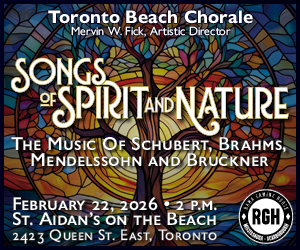EDITOR’S CORNER
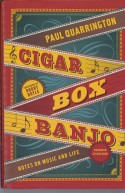 As I prepare to write this month’s column I find myself engrossed in re-reading a book I want to tell you about – Cigar Box Banjo: Notes on Music and Life by Paul Quarrington, published posthumously under the Greystone Books imprint of D & M Publishers Inc. (ISBN 978-I-55365-438-4). In May 2009 Quarrington was diagnosed with Stage 4 lung cancer. For the next eight months he channelled his creative energy into a number of artistic endeavours, including his first solo CD release “Paul Quarrington: The Songs” (Cordova Bay Records CBR-0822), the documentary film “Paul Quarrington: Life in Music”, the third CD release with the band Porkbelly Futures, and this book. It is an enthralling read, a wonderful mingling of musicological musing and personal memoire, made more poignant as we aware of the ending before we begin. Although best known for his novels, Quarrington had an interest in music and an urge to perform from an early age. “Cigar Box Banjo” leads us through not only his own musical development, but also that of many popular music forms of the 20th century. Woody Guthrie, Bill Munroe and his Blue Grass Boys, Leadbelly, The New Lost City Ramblers, the Kingston Trio, Bo Diddley, the Beatles and Ed Thigpen all have cameos in the early pages, along with Quarrington’s paternal grandfather Joe, an accomplished multi-instrumentalist who played violin in the Ottawa Symphony. We follow Paul from his first instrument (mandolin) and his first band – PQ’s People with his brother Joel (later to serve as principal bass in both the TSO and the NACO) - through a juvenile songwriting partnership with Dan Hill, a lifelong musical association with Martin Worthy, an extended stint as bass player and background vocalist with Joe Hall’s Continental Drift (with older brother Tony on guitar), a collaboration with The Rheostatics on the soundtrack of the film “Whale Music” (for which he adapted the screenplay from his Governor General’s Award-winning novel) and the latter day adventures of Porkbelly Futures - a “thinking man’s bar band” - in which he sang and played rhythm guitar right up to the last days of his life. We are also treated to PQ’s warm and humourous memories of (misspent) youth, (failed) marriage and (mostly successful) parenting. Some of the most compelling stories are those of friendship. His capacity for sharing shines throughout this book and even those of us who did not have the privilege of knowing him personally are left feeling that we did. “Cigar Box Banjo” includes a CD/DVD-ROM with three of his final songs and two short videos. Make sure to check inside the back cover for the disc, and listen to Are You Ready?, an amazing testament to a life well-lived: “No one can tell me where I’m gonna be / When I sail into that mystery / I know I’m falling, don’t know where I’m gonna land / Are you ready? Are you ready? I believe I am.” (www.paulquarrington.com)
As I prepare to write this month’s column I find myself engrossed in re-reading a book I want to tell you about – Cigar Box Banjo: Notes on Music and Life by Paul Quarrington, published posthumously under the Greystone Books imprint of D & M Publishers Inc. (ISBN 978-I-55365-438-4). In May 2009 Quarrington was diagnosed with Stage 4 lung cancer. For the next eight months he channelled his creative energy into a number of artistic endeavours, including his first solo CD release “Paul Quarrington: The Songs” (Cordova Bay Records CBR-0822), the documentary film “Paul Quarrington: Life in Music”, the third CD release with the band Porkbelly Futures, and this book. It is an enthralling read, a wonderful mingling of musicological musing and personal memoire, made more poignant as we aware of the ending before we begin. Although best known for his novels, Quarrington had an interest in music and an urge to perform from an early age. “Cigar Box Banjo” leads us through not only his own musical development, but also that of many popular music forms of the 20th century. Woody Guthrie, Bill Munroe and his Blue Grass Boys, Leadbelly, The New Lost City Ramblers, the Kingston Trio, Bo Diddley, the Beatles and Ed Thigpen all have cameos in the early pages, along with Quarrington’s paternal grandfather Joe, an accomplished multi-instrumentalist who played violin in the Ottawa Symphony. We follow Paul from his first instrument (mandolin) and his first band – PQ’s People with his brother Joel (later to serve as principal bass in both the TSO and the NACO) - through a juvenile songwriting partnership with Dan Hill, a lifelong musical association with Martin Worthy, an extended stint as bass player and background vocalist with Joe Hall’s Continental Drift (with older brother Tony on guitar), a collaboration with The Rheostatics on the soundtrack of the film “Whale Music” (for which he adapted the screenplay from his Governor General’s Award-winning novel) and the latter day adventures of Porkbelly Futures - a “thinking man’s bar band” - in which he sang and played rhythm guitar right up to the last days of his life. We are also treated to PQ’s warm and humourous memories of (misspent) youth, (failed) marriage and (mostly successful) parenting. Some of the most compelling stories are those of friendship. His capacity for sharing shines throughout this book and even those of us who did not have the privilege of knowing him personally are left feeling that we did. “Cigar Box Banjo” includes a CD/DVD-ROM with three of his final songs and two short videos. Make sure to check inside the back cover for the disc, and listen to Are You Ready?, an amazing testament to a life well-lived: “No one can tell me where I’m gonna be / When I sail into that mystery / I know I’m falling, don’t know where I’m gonna land / Are you ready? Are you ready? I believe I am.” (www.paulquarrington.com)
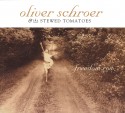 Oliver Schroer is another Toronto artist who took the opportunity of impending death, in this case from leukemia, to focus on creation and to return to an unfinished project. Freedom Row (Borealis Records BCD201 www.borealisrecords.com) was begun a dozen years ago as Schroer’s second album with The Stewed Tomatoes when the initial tracks were laid down. In Schroer’s words, “I whittled away at it since then. It moved with the speed of glacier…” When he returned to it a decade later “at that point the album just finished itself. It was a breeze. The last overdubs were a joy, and mixing was a pleasure.” Some of the final recordings were done in Schroer’s hospital room at Princess Margaret during his last days in 2008. His distinctive fiddling is complemented by core members of the Stewed Tomatoes Rich Greenspoon (drums), Ben Grossman (various and sundry), Rich Pell (guitar), David Woodhead (bass) and David Travers-Smith (trumpet), with a vast array of accomplished guests. Basically an instrumental album, “Freedom Row” has occasional forays into the vocal realm, notably with the exuberant chorus in All the Little Children in the World, and vocalizations by Schroer, Christine Duncan, Tanya Tagaq and Michele George on several other tracks. The music itself is mostly upbeat, combining Schroer’s lilting country and Celtic fiddling with a variety of other influences and often featuring jazzy horn arrangements by Colleen Allen. In his introductory note Schroer says “This album is a party. It is a bouncy look back and a joyful look forward. We remain ‘stewed but not subdued!’” It’s a party we’re invited to join, perhaps in the spirit of a New Orleans funeral procession – a joyous send off for an artist who will be remembered fondly. (www.oliverschroer.org)
Oliver Schroer is another Toronto artist who took the opportunity of impending death, in this case from leukemia, to focus on creation and to return to an unfinished project. Freedom Row (Borealis Records BCD201 www.borealisrecords.com) was begun a dozen years ago as Schroer’s second album with The Stewed Tomatoes when the initial tracks were laid down. In Schroer’s words, “I whittled away at it since then. It moved with the speed of glacier…” When he returned to it a decade later “at that point the album just finished itself. It was a breeze. The last overdubs were a joy, and mixing was a pleasure.” Some of the final recordings were done in Schroer’s hospital room at Princess Margaret during his last days in 2008. His distinctive fiddling is complemented by core members of the Stewed Tomatoes Rich Greenspoon (drums), Ben Grossman (various and sundry), Rich Pell (guitar), David Woodhead (bass) and David Travers-Smith (trumpet), with a vast array of accomplished guests. Basically an instrumental album, “Freedom Row” has occasional forays into the vocal realm, notably with the exuberant chorus in All the Little Children in the World, and vocalizations by Schroer, Christine Duncan, Tanya Tagaq and Michele George on several other tracks. The music itself is mostly upbeat, combining Schroer’s lilting country and Celtic fiddling with a variety of other influences and often featuring jazzy horn arrangements by Colleen Allen. In his introductory note Schroer says “This album is a party. It is a bouncy look back and a joyful look forward. We remain ‘stewed but not subdued!’” It’s a party we’re invited to join, perhaps in the spirit of a New Orleans funeral procession – a joyous send off for an artist who will be remembered fondly. (www.oliverschroer.org)
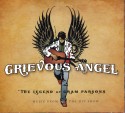 One of the most pleasant evenings I spent in recent months was at Hugh’s Room for a show from Ottawa entitled Grievous Angel – The Legend of Gram Parsons. Billed as “A theatrical concert about the original cosmic cowboy--he lived fast, died young and left a charred corpse” it featured very convincing performances by Anders Drerup as Gram Parsons and Kelly Prescott as Parsons’ young protégé Emmylou Harris. Similar in concept to the 1977 production “Hank Williams – the Show He Never Gave” which also originated in Ottawa, “Grievous Angel” was inspired by Michael Bate's March 1973 interview with the doomed singer in Boston - Parsons' last recorded conversation. The theatrical concert is produced and directed by Michael Bate, written by Michael Bate with David McDonald. A mixture of song and monologue, the well crafted production manages to convey the tragic story of Parsons’ life while presenting dynamic (and true to the original) versions of the songs which have become his lasting legacy. The excellent five-piece backup band provides a rhythm section that just doesn’t quit. Although this summer’s Hugh’s Room date was the only scheduled Toronto performance of the show, it will be performed at Montreal’s La Sala Rossa on September 17, the National Arts Centre’s Stage 4 on September 25 and Rideau Vista Public School in Westport ON October 2 before heading off on a tour which includes stops in California, Oregon and Washington this fall. A CD, optimistically subtitled “Music from the Hit Show”, is available at www.legendofgramparsons.com.
One of the most pleasant evenings I spent in recent months was at Hugh’s Room for a show from Ottawa entitled Grievous Angel – The Legend of Gram Parsons. Billed as “A theatrical concert about the original cosmic cowboy--he lived fast, died young and left a charred corpse” it featured very convincing performances by Anders Drerup as Gram Parsons and Kelly Prescott as Parsons’ young protégé Emmylou Harris. Similar in concept to the 1977 production “Hank Williams – the Show He Never Gave” which also originated in Ottawa, “Grievous Angel” was inspired by Michael Bate's March 1973 interview with the doomed singer in Boston - Parsons' last recorded conversation. The theatrical concert is produced and directed by Michael Bate, written by Michael Bate with David McDonald. A mixture of song and monologue, the well crafted production manages to convey the tragic story of Parsons’ life while presenting dynamic (and true to the original) versions of the songs which have become his lasting legacy. The excellent five-piece backup band provides a rhythm section that just doesn’t quit. Although this summer’s Hugh’s Room date was the only scheduled Toronto performance of the show, it will be performed at Montreal’s La Sala Rossa on September 17, the National Arts Centre’s Stage 4 on September 25 and Rideau Vista Public School in Westport ON October 2 before heading off on a tour which includes stops in California, Oregon and Washington this fall. A CD, optimistically subtitled “Music from the Hit Show”, is available at www.legendofgramparsons.com.
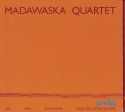 I did not spend the whole summer in the realm of popular music (or dead people for that matter). One of the most interesting contemporary art music discs to arrive in recent months is Prefab featuring Toronto’s Madawaska String Quartet (Artifact Music ART-039). The predominantly contemporary repertoire is complemented by Fantasia No.7 for Four Viols by Henry Purcell (1659-1695). This anachronistic inclusion may seem a strange choice, but the very forward looking Baroque piece blends deceptively well with the works that surround it. Musically the transitions are almost seamless, but I am left scratching my head as to how the Madawaska achieve the ethereal sound of viols on their modern instruments. Purcell is preceded by British composer Anthony Gilbert (b.1934) who based his String Quartet No.3 on a double hocket by Guillaume de Machaut (c.1300–1377) which in turn was an elaboration on an organum written by Perotin sometime around 1200. Soviet composer Alfred Schnittke (1934-1998) was known for his eclectic polystylistic approach and his String Quartet No.3, which follows Purcell’s Fantasia, begins with a quotation from the Stabat Mater of Orlando di Lasso (1532-1594). At eighteen minutes the Schnittke is the most substantial work on the disc. It is followed by Spanish Garland, a homophonic setting of twelve folk melodies from Spain by Montreal-based composer José Evangelista. These unadorned folk tunes also harken back to much earlier times. Although the works of Mike Kane and Bruce Russell which open and close the disc do not show any obvious connection to centuries before the 20th, Kane’s Three Short Seasons and Russell’s Madra somehow seem like perfect companion pieces to complete this very well programmed disc. The personnel of the Madawaska Quartet has recently changed, with Mary-Elizabeth Brown replacing founding violinist Rebecca van der Post, but this 2009 recording features the original line-up: van der Post and Sarah Fraser Raff, violins, Anna Redekop, viola and Amber Ghent, cello. “Prefab” is available from the Canadian Music Centre www.musiccentre.ca. Toronto audiences will have to wait until February 16 to hear the new line up in performance at the Arts and Letters Club (there will be performances in London in December and Kitchener-Waterloo in January), but in the interim the quartet continues its practice of supporting young and emerging composers, with readings of their works on September 27 and November 1.
I did not spend the whole summer in the realm of popular music (or dead people for that matter). One of the most interesting contemporary art music discs to arrive in recent months is Prefab featuring Toronto’s Madawaska String Quartet (Artifact Music ART-039). The predominantly contemporary repertoire is complemented by Fantasia No.7 for Four Viols by Henry Purcell (1659-1695). This anachronistic inclusion may seem a strange choice, but the very forward looking Baroque piece blends deceptively well with the works that surround it. Musically the transitions are almost seamless, but I am left scratching my head as to how the Madawaska achieve the ethereal sound of viols on their modern instruments. Purcell is preceded by British composer Anthony Gilbert (b.1934) who based his String Quartet No.3 on a double hocket by Guillaume de Machaut (c.1300–1377) which in turn was an elaboration on an organum written by Perotin sometime around 1200. Soviet composer Alfred Schnittke (1934-1998) was known for his eclectic polystylistic approach and his String Quartet No.3, which follows Purcell’s Fantasia, begins with a quotation from the Stabat Mater of Orlando di Lasso (1532-1594). At eighteen minutes the Schnittke is the most substantial work on the disc. It is followed by Spanish Garland, a homophonic setting of twelve folk melodies from Spain by Montreal-based composer José Evangelista. These unadorned folk tunes also harken back to much earlier times. Although the works of Mike Kane and Bruce Russell which open and close the disc do not show any obvious connection to centuries before the 20th, Kane’s Three Short Seasons and Russell’s Madra somehow seem like perfect companion pieces to complete this very well programmed disc. The personnel of the Madawaska Quartet has recently changed, with Mary-Elizabeth Brown replacing founding violinist Rebecca van der Post, but this 2009 recording features the original line-up: van der Post and Sarah Fraser Raff, violins, Anna Redekop, viola and Amber Ghent, cello. “Prefab” is available from the Canadian Music Centre www.musiccentre.ca. Toronto audiences will have to wait until February 16 to hear the new line up in performance at the Arts and Letters Club (there will be performances in London in December and Kitchener-Waterloo in January), but in the interim the quartet continues its practice of supporting young and emerging composers, with readings of their works on September 27 and November 1.
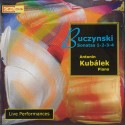 Further on in these pages you will find Janos Gardonyi’s extended article on Antonin Kubálek’s recent spate of CD releases. Mr. Kubálek has been mining the archives and has come up with some real gems for his private CD label. One that I held back for my own collection is Buczynski – Sonatas 1, 2, 3, 4 (AK03). Walter Buczynski (b.1933) has been a fixture on the Toronto scene throughout his career, first as a pianist, debuting with the TSO in 1955 with a Chopin concerto, later as a teacher at both the RCMT and U of T, and as a composer. Since 1975 Buczynski has rarely performed in public, choosing to focus on composing and teaching, and has let others, most notably Kubálek, champion his contributions to the piano repertoire. This 2-CD set includes live CBC broadcast recordings of the four sonatas from 1979, 1983, 1991 and 1993 respectively, the last three being the world premiere performances. Each work creates its own sound world and taken together they provide a broad picture of piano writing in the latter years of the 20th century and demonstrate Buczynski’s breadth of artistic vision. From the percussive “Sonata de Cameron” to the dark and mysterious “Textures”, Kubálek is obviously at home in this repertoire. His performances are fluid, thoughtful and exuberant as required, and as the enthusiastic applause attests, thoroughly engaging.
Further on in these pages you will find Janos Gardonyi’s extended article on Antonin Kubálek’s recent spate of CD releases. Mr. Kubálek has been mining the archives and has come up with some real gems for his private CD label. One that I held back for my own collection is Buczynski – Sonatas 1, 2, 3, 4 (AK03). Walter Buczynski (b.1933) has been a fixture on the Toronto scene throughout his career, first as a pianist, debuting with the TSO in 1955 with a Chopin concerto, later as a teacher at both the RCMT and U of T, and as a composer. Since 1975 Buczynski has rarely performed in public, choosing to focus on composing and teaching, and has let others, most notably Kubálek, champion his contributions to the piano repertoire. This 2-CD set includes live CBC broadcast recordings of the four sonatas from 1979, 1983, 1991 and 1993 respectively, the last three being the world premiere performances. Each work creates its own sound world and taken together they provide a broad picture of piano writing in the latter years of the 20th century and demonstrate Buczynski’s breadth of artistic vision. From the percussive “Sonata de Cameron” to the dark and mysterious “Textures”, Kubálek is obviously at home in this repertoire. His performances are fluid, thoughtful and exuberant as required, and as the enthusiastic applause attests, thoroughly engaging.
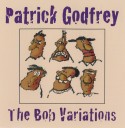
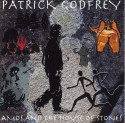 Over the summer I was contacted by Patrick Godfrey, a multi-talented musician and record producer who I first met about 25 years ago when his Apparition Records label released a disc of piano music of Tim Brady performed by Marc Widner. At that time Patrick had a studio in Cabbagetown, but he has since moved his operations out to Vancouver Island where he works primarily as a film animation composer (most notably the soundtrack to the Academy Award winning NFB animation “Bob’s Birthday” back in 1993). Patrick sent along three recent releases, each presenting a very different side of his musical personality.
Over the summer I was contacted by Patrick Godfrey, a multi-talented musician and record producer who I first met about 25 years ago when his Apparition Records label released a disc of piano music of Tim Brady performed by Marc Widner. At that time Patrick had a studio in Cabbagetown, but he has since moved his operations out to Vancouver Island where he works primarily as a film animation composer (most notably the soundtrack to the Academy Award winning NFB animation “Bob’s Birthday” back in 1993). Patrick sent along three recent releases, each presenting a very different side of his musical personality.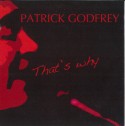 The Bob Variations is a 2010 set of piano re-interpretations of the playful “Bob Theme” in a variety of styles. Amos and the House of Stones is harder to describe. Harpsichord is front and centre in most of the mixes, but the instrumentation is varied and deceiving - surprisingly convincing synthesized string sounds, organ (sometimes masquerading as a calliope) and mallet percussion lines are mixed with sounds that make no effort to hide their electronic origins. It is an eclectic mix of pop, jazz and new age influences. That’s Why is a straight-ahead singer-songwriter mix of ballads, blues and the occasional rocker with vocals, keyboards, drums, bass and synthetic orchestrations all composed and performed by Godfrey. You can find the offerings of this true “Renaissance Man” at www.patrickgodfrey.com – it’s well worth the visit.
The Bob Variations is a 2010 set of piano re-interpretations of the playful “Bob Theme” in a variety of styles. Amos and the House of Stones is harder to describe. Harpsichord is front and centre in most of the mixes, but the instrumentation is varied and deceiving - surprisingly convincing synthesized string sounds, organ (sometimes masquerading as a calliope) and mallet percussion lines are mixed with sounds that make no effort to hide their electronic origins. It is an eclectic mix of pop, jazz and new age influences. That’s Why is a straight-ahead singer-songwriter mix of ballads, blues and the occasional rocker with vocals, keyboards, drums, bass and synthetic orchestrations all composed and performed by Godfrey. You can find the offerings of this true “Renaissance Man” at www.patrickgodfrey.com – it’s well worth the visit.
We welcome your feedback and invite submissions. CDs and comments should be sent to: The WholeNote, 503 – 720 Bathurst St. Toronto ON M5S 2R4.
David Olds
DISCoveries Editor



